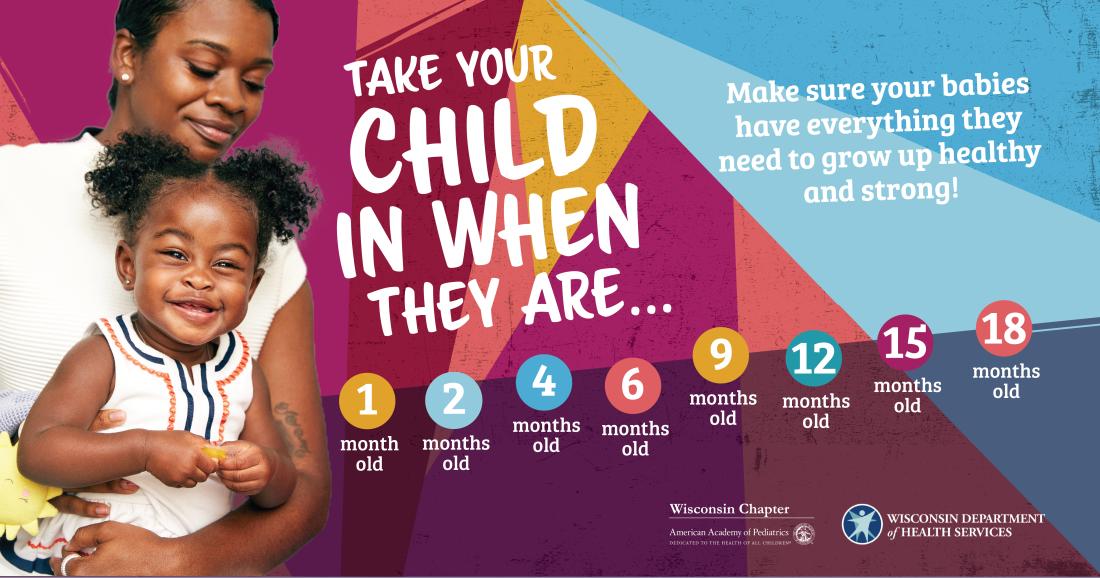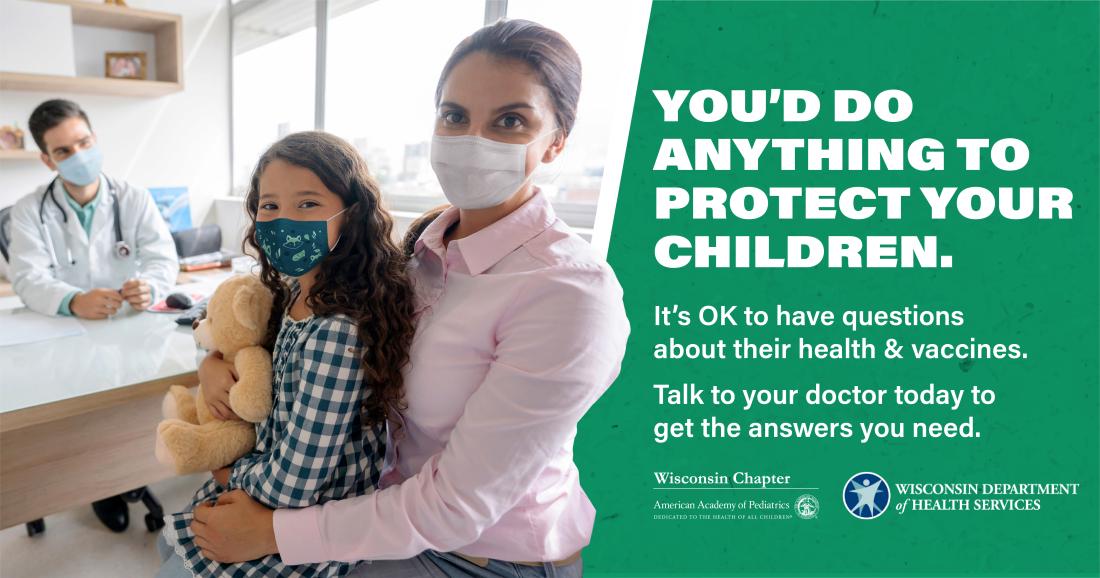Immunizations: Childhood and Adolescent Vaccine Information
Vaccines are the best way to protect the health of our children. Before vaccines, many children died from diseases like measles, pertussis (whooping cough), and Haemophilus influenzae. Vaccines now prevent those diseases and many others.
The viruses and bacteria that cause these diseases still exist. Some of these diseases make children very sick. Some are deadly, especially for young children. That’s why it’s important that every child gets the vaccines they need on time.
No matter the age of your children, vaccines are one of the best ways you can protect them.
Vaccines protect individuals and communities
Vaccines give us immunity, or protection, against diseases. When most people are immune, the disease has less chance to spread. This is called community immunity, or herd immunity. The more people who are immune, the better the protection. That’s why your child’s vaccine can help protect others in the community.
Vaccine schedules
Vaccine schedules show when and how often we should get vaccines for the best protection. The country’s top doctors, public health professionals, and scientists design a vaccine schedule to ensure it is safe and effective. It’s based on:
- How your child’s immune system responds to vaccines at different ages.
- How likely your child is to be exposed to a particular disease.
Your child should receive vaccines during six different appointments in the first year of life! They need several vaccines between ages 1 and 2.
Then your child needs to see the doctor at least once a year between ages 2 and 19. This ensures your little one is protected from 14 serious diseases at exactly the right time.
All children ages 6 months and older need to get COVID-19 vaccines. COVID-19 can make children and teens of any age very sick. Getting the vaccine can prevent your child from COVID-19 sickness and complications.
See the vaccine schedules for children at different ages below. You can also view the Wisconsin Department of Health Services' (DHS) Recommended Vaccination Schedules for Wisconsinites webpage to learn when different vaccines are recommended.
Staying up to date
Infants and young children are especially vulnerable to infections. That is why it is so important to get your children the vaccines they need on time.
Are your children’s vaccines up to date? It’s easy to find out. Call your child’s doctor to ask. Or look up the records yourself on the Wisconsin Immunization Registry.
If your child has missed any vaccines, schedule an appointment to get them caught up. Children’s immunity fades over time. They need extra doses of some vaccines. These vaccine boosters ensure the best protection for your child.
Find your child’s vaccine record on the Wisconsin Immunization Registry
Your baby’s immune system isn’t fully developed at birth. This puts your baby at risk for infection.
Children are exposed to thousands of germs every day. Without vaccines, your child is at risk for serious illness, even death, from diseases caused by these germs.
Children need vaccines to strengthen their immune systems (the body’s way of fighting germs and preventing disease). Vaccines work with the body’s natural defenses to help safely protect us.
What vaccines does my child need?
During your child’s first two years of life, they need vaccines to protect against many illnesses. These include hepatitis B, chickenpox, whooping cough, measles, and more.
Every year in the early fall, children 6 months and older should get a flu vaccine.
To learn when different vaccines are recommended, see Recommended Vaccination Schedules for Wisconsinites.
Consider getting the Text4Baby mobile app. This free service helps you keep track of vaccines and appointments. It also sends helpful tips on self-care and other topics.
Does my child need vaccines for child care or school?
State law requires children to get certain vaccines to attend day care centers and schools. See the list of vaccines in the Student Immunization Law Age/Grade Requirements, P-44021 (PDF).
Vaccines are important for preteens. Vaccines protect them from diseases they can get today. Vaccines also protect them from illnesses they can develop in the future.
What vaccines does my 11- to 12-year-old need?
Preteens need protection with four vaccines:
- Tdap booster. This continues protection against tetanus, diphtheria, and pertussis (whooping cough).
- Human papillomavirus (HPV) vaccine. This vaccine prevents some pre-cancers and cancers related to HPV. Most children should get two doses before they turn 13 years old.
- Quadrivalent meningococcal conjugate (MCV4) vaccine. The meningococcal vaccine protects against infection in the lining of the brain and spinal cord. It also protects against infections in your child’s bloodstream.
- Annual influenza vaccine, also called the flu shot. It protects against a virus that infects the lungs, nose, and throat. The American Academy of Pediatrics (AAP) recommends annual influenza immunization of all children without medical contraindications, starting at 6 months of age.
Learn about Vaccines Recommended at Ages 11–12: What Parents Should Know, P-90022.
Other resources about preteens
- Vaccinate Your Family offers a variety of helpful resources.
- Check out the Children’s Hospital of Philadelphia’s Vaccine Education Center for up-to-date information.
Your older teens need vaccines, too. Immunity from vaccines we get as young children wears off. Make an appointment with your teen’s doctor today. That will ensure they’re fully protected against diseases that can be prevented with vaccines.
Teaching teens to make regular health check-ups creates healthy habits for life! Don’t forget that every year in early fall, everyone 6 months of age and older needs a flu shot.
What vaccines does my teen need?
Teenagers should be protected with these vaccines:
- Booster shot of the quadrivalent meningococcal conjugate (MCV4) vaccine. The meningococcal vaccine protects against infection in the lining of the brain and spinal cord. It also protects against infections in your child’s bloodstream. A booster dose continues protecting your child while their risk of infection is highest.
- Meningococcal serogroup B vaccine, recommended by the American Academy of Pediatrics (AAP) for patients ages 16–23. This vaccine helps protect against another strain of the bacteria that causes meningitis.
- COVID-19 vaccine. The AAP recommends every child 6 months and older be protected against COVID-19, especially infants and children at high risk for complications due to underlying health concerns. Getting your child vaccinated helps prevent them from getting severely sick and helps protect them from long-term complications or even death.
- Annual influenza vaccine, also called the flu shot. It protects against a virus that infects the lungs, nose, and throat. The CDC explains Who Needs A Flu Vaccine, and recommends getting it in early fall of each year.
- Speak with your child’s doctor to make sure your child is up to date on all vaccines, including HPV, MMR, and Tdap.
- Vaccinate Your Family offers answers to commonly asked questions.
- Check out the CDC’s The Journey of Your Child’s Vaccine. The same process is followed to develop vaccines for people of all ages.
Preparing yourself and your child for vaccinations
There are simple ways to comfort your child.
- DHS shares Tips on how to be there for your child during vaccinations, P-03122 (PDF).
- The CDC offers nine strategies to Make Shots Less Stressful.
- The Children’s Hospital of Philadelphia has several resources, including Preparing for Vaccines.
Gently remind your child that the vaccine will prevent an illness that would be much worse than a shot.
If your child is afraid of needles, you may be able to get certain vaccines without needles. A few vaccines are available in a nasal spray. Ask your doctor or pharmacist about your options.
If a shot is required, your child can try these ways to stay calm:
- Take deep breaths.
- Eat sugar (a lollipop or piece of hard candy, for example).
- Use a topical anesthetic to numb the injection site.
For younger children, learn How to Hold Your Child During Vaccination.
Vaccine safety
Vaccines are some of the safest medical products available, although there are risks with any medical product. Vaccines are our best defense against diseases. Some diseases cause short-term illness, and some diseases are deadly.
What are vaccine side effects?
The most common side effects are soreness, redness, or swelling at the injection site. Sometimes the vaccine will cause a low-grade fever.
Why do some vaccines have additives in them?
Vaccine Ingredients help make the vaccines work better. For example, thimerosal is added to some vaccines to protect the vial from bacteria and fungus. Thimerosal leaves the body quickly, so it doesn’t build up or cause harm.
How are vaccines monitored for safety?
To understand how vaccines are developed, read How Vaccines Are Developed, Safety Tested & Approved.
The CDC and the Food and Drug Administration monitor approved vaccines in several ways:
- Vaccine Adverse Event Reporting System
- Vaccine Safety Datalink
- Clinical Immunization Safety Assessment
Vaccine locations
Vaccines are offered in many pharmacies, doctor’s offices, and health departments. Check in advance if they have the vaccines you need. If you have health insurance, call your doctor’s office, pharmacy, or health insurance company. They can tell you where you can get vaccines and how much it will cost.
Vaccine cost
Most private health insurance plans cover vaccines at no extra cost to you. Medicaid also pays for many vaccines. Call your insurance provider to ask what’s covered under your plan. If you want to get health insurance, see our webpage on finding and choosing insurance.
If you’re concerned about the cost of vaccines, you may be eligible for free vaccines through our Vaccines For Children program.
Some locations offer vaccines at low or no cost. Lower cost vaccines may be available at a Federally Qualified Health Center (FQHC), Rural Health Clinic (RHC) or your local health department. Make sure to check ahead of time which vaccines are available and how much they would cost.


